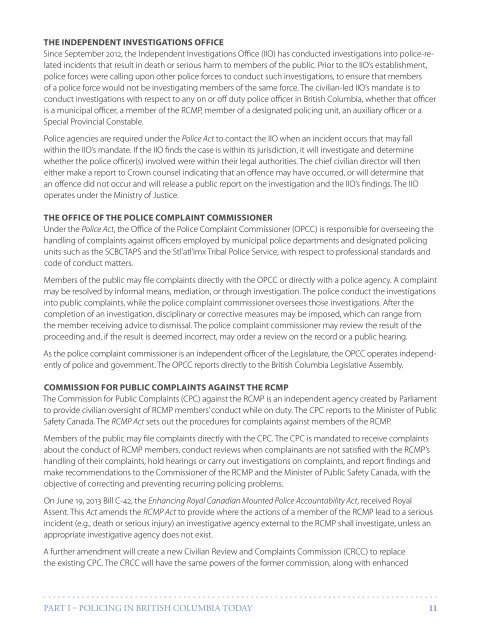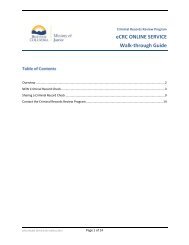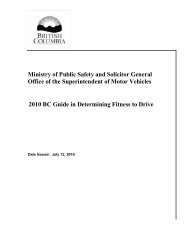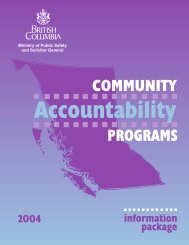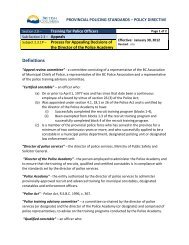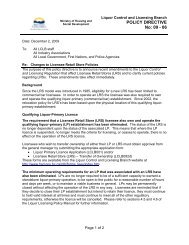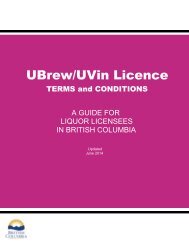BC Policing and Community Safety Plan - Ministry of Justice ...
BC Policing and Community Safety Plan - Ministry of Justice ...
BC Policing and Community Safety Plan - Ministry of Justice ...
You also want an ePaper? Increase the reach of your titles
YUMPU automatically turns print PDFs into web optimized ePapers that Google loves.
THE INDEPENDENT INVESTIGATIONS OFFICESince September 2012, the Independent Investigations Office (IIO) has conducted investigations into police-relatedincidents that result in death or serious harm to members <strong>of</strong> the public. Prior to the IIO’s establishment,police forces were calling upon other police forces to conduct such investigations, to ensure that members<strong>of</strong> a police force would not be investigating members <strong>of</strong> the same force. The civilian-led IIO’s m<strong>and</strong>ate is toconduct investigations with respect to any on or <strong>of</strong>f duty police <strong>of</strong>ficer in British Columbia, whether that <strong>of</strong>ficeris a municipal <strong>of</strong>ficer, a member <strong>of</strong> the RCMP, member <strong>of</strong> a designated policing unit, an auxiliary <strong>of</strong>ficer or aSpecial Provincial Constable.Police agencies are required under the Police Act to contact the IIO when an incident occurs that may fallwithin the IIO’s m<strong>and</strong>ate. If the IIO finds the case is within its jurisdiction, it will investigate <strong>and</strong> determinewhether the police <strong>of</strong>ficer(s) involved were within their legal authorities. The chief civilian director will theneither make a report to Crown counsel indicating that an <strong>of</strong>fence may have occurred, or will determine thatan <strong>of</strong>fence did not occur <strong>and</strong> will release a public report on the investigation <strong>and</strong> the IIO’s findings. The IIOoperates under the <strong>Ministry</strong> <strong>of</strong> <strong>Justice</strong>.THE OFFICE OF THE POLICE COMPLAINT COMMISSIONERUnder the Police Act, the Office <strong>of</strong> the Police Complaint Commissioner (OPCC) is responsible for overseeing theh<strong>and</strong>ling <strong>of</strong> complaints against <strong>of</strong>ficers employed by municipal police departments <strong>and</strong> designated policingunits such as the SC<strong>BC</strong>TAPS <strong>and</strong> the Stl’atl’imx Tribal Police Service, with respect to pr<strong>of</strong>essional st<strong>and</strong>ards <strong>and</strong>code <strong>of</strong> conduct matters.Members <strong>of</strong> the public may file complaints directly with the OPCC or directly with a police agency. A complaintmay be resolved by informal means, mediation, or through investigation. The police conduct the investigationsinto public complaints, while the police complaint commissioner oversees those investigations. After thecompletion <strong>of</strong> an investigation, disciplinary or corrective measures may be imposed, which can range fromthe member receiving advice to dismissal. The police complaint commissioner may review the result <strong>of</strong> theproceeding <strong>and</strong>, if the result is deemed incorrect, may order a review on the record or a public hearing.As the police complaint commissioner is an independent <strong>of</strong>ficer <strong>of</strong> the Legislature, the OPCC operates independently<strong>of</strong> police <strong>and</strong> government. The OPCC reports directly to the British Columbia Legislative Assembly.COMMISSION FOR PUBLIC COMPLAINTS AGAINST THE RCMPThe Commission for Public Complaints (CPC) against the RCMP is an independent agency created by Parliamentto provide civilian oversight <strong>of</strong> RCMP members’ conduct while on duty. The CPC reports to the Minister <strong>of</strong> Public<strong>Safety</strong> Canada. The RCMP Act sets out the procedures for complaints against members <strong>of</strong> the RCMP.Members <strong>of</strong> the public may file complaints directly with the CPC. The CPC is m<strong>and</strong>ated to receive complaintsabout the conduct <strong>of</strong> RCMP members, conduct reviews when complainants are not satisfied with the RCMP’sh<strong>and</strong>ling <strong>of</strong> their complaints, hold hearings or carry out investigations on complaints, <strong>and</strong> report findings <strong>and</strong>make recommendations to the Commissioner <strong>of</strong> the RCMP <strong>and</strong> the Minister <strong>of</strong> Public <strong>Safety</strong> Canada, with theobjective <strong>of</strong> correcting <strong>and</strong> preventing recurring policing problems.On June 19, 2013 Bill C-42, the Enhancing Royal Canadian Mounted Police Accountability Act, received RoyalAssent. This Act amends the RCMP Act to provide where the actions <strong>of</strong> a member <strong>of</strong> the RCMP lead to a seriousincident (e.g., death or serious injury) an investigative agency external to the RCMP shall investigate, unless anappropriate investigative agency does not exist.A further amendment will create a new Civilian Review <strong>and</strong> Complaints Commission (CRCC) to replacethe existing CPC. The CRCC will have the same powers <strong>of</strong> the former commission, along with enhancedPART I – POLICING IN BRITISH COLUMBIA TODAY 11


